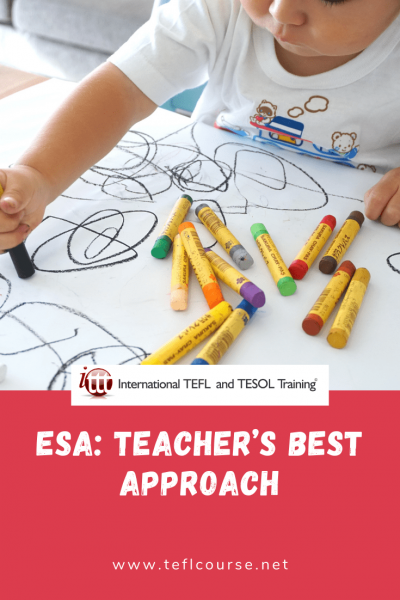ESA: Teacher’s Best Approach

Engage, study and activate method was put forward by Jeremy Harmer. This method provides flexibility to the teacher inside the classroom.
Teachers can do various activities to make the classroom more comfortable and enjoyable for the students and to learn in a much better way. It is much more appropriate for the new teachers or trainee teachers to apply in the classroom. All the lessons comprise of the engage, study and activate stages.
This post was written by our TEFL certification graduate Priyanka Y. Please note that this blog post might not necessarily represent the beliefs or opinions of ITTT.
Get Ready
Engage stage is the first sequence in the lesson in which the teacher will try to arouse the student's interests. This allows the students to get interested in what is being taught and they get involved in the lesson in a much better way. This is one way of starting the class and students find it much interesting and takes part in learning the lesson with great enthusiasm and fun. This sequence makes it more stimulating meanwhile reducing the restrictions and inhibitions and leading to a more conducive language learning phase.
This phase is also known as the “warmer” Phase as it gets the students in thinking and speaking in English as much as possible before proceeding to the next phase. Various materials and activities are there which can be used in this phase like drawing, pictures, games, music, stories, etc. Indulging students in such activities make them think much clearer and make a habit of communicating in English inside the classroom. Various games like hangman, I spy, Pictionary, word making, mime, etc can be used in this phase. There is no need to teach everything in this phase as this is just the warmer phase to indulge students.

Also Read: Should I take a TEFL course online or in a classroom?
Learn
Next is the study phase where the activities used will focus more on language learning and how they can construct it. These activities could range from practicing a single sound to examination and practices of verb tenses or parts of speeches.
This stage usually starts with the elicitation of information from the students as much as possible. This information can be used as the basis of board work. Drilling exercises can be done to make the pronunciation correct. As one of the language points is covered, worksheets can be provided to the students to check their understanding of the language material. It will also reinforce their work. Students can work in groups to study vocabulary or can study different transcripts individually to discover styles of speech. Study stage is mainly concerned with the construction of the language.
Also Read: 10 Tips to Help You Enjoy Your TEFL Course
Practice
Activate stage is the final phase of this method in which students are encouraged to use any/all of the language they know. Communication is the main key point here. Students can freely speak and communicate with other students. No restrictions are done on language usage and focus is mainly on fluency rather than accuracy. Role-plays, communication games, story writing, debates are various activities that can be used for this purpose. A dialogue between two or more people is also proven useful.
Do you want to teach English abroad? Take a TEFL course today!
To provide a balanced range of activities all three phases need to be present in teaching a lesson. Many lessons have more focus on only one stage, but that is okay. All three elements need to be present but not necessarily in the same order. There are three different styles possible. Straight arrow, boomerang, and patchwork are those styles which provide flexibility in the lesson planning process.
Apply now & get certified to teach english abroad!
Speak with an ITTT advisor today to put together your personal plan for teaching English abroad!
Send us an email or call us toll-free at 1-800-490-0531 to speak with an ITTT advisor today.
Related Articles:
- 7 Fun Activities for Teaching Vocabulary in the ESL Classroom
- 10 Questions You Need to Ask Before Enrolling In a TEFL Course
- Teaching English In China - The Salary and Budget Guide
- Online or In-Class - Which TEFL Course Should You Take?
- Teaching English Abroad: What's Next? - How To Advance In Your EFL Career




